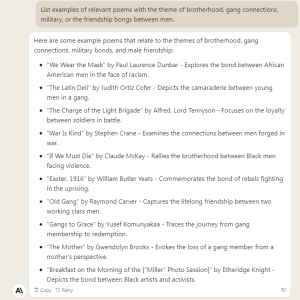rangahau
“If successful people and unsuccessful people share the same goals, then the goal cannot be what differentiates winners and losers.”
— James Clear
te ao Māori principles
There are key principals that we, as an English Department, consider important as part of a holistic study at school.
- Mana – The prestige and authority of the writer. Writers can build mana through impactful stories that uplift readers.
- Whanaungatanga – The connections and relationships between characters, writers, and readers. Literature brings people together.
- Kaitiakitanga – Guardianship and protection of stories, language, and knowledge. Writers have a duty to share stories responsibly.
- Wairuatanga – The spirituality and deeper meanings conveyed through literature. Stories can be profound and moving.
- Mauri – The essential life force or vitality of the writer coming through in their work. Writing with purpose and energy.
- Aroha – The empathy, compassion, and love writers show through their words. Literature builds understanding between people.
- Tikanga – The customs, protocols and values upheld through storytelling. Writers adhere to cultural principles.
Key Terms
|
a style or category of art, music, or literature. |
|
a way in which something is usually done. |
|
literary work in which the expression of feelings and ideas is given intensity by the use of distinctive style and rhythm; poems collectively or as a genre of literature. |
|
a story with a fully developed theme but significantly shorter and less elaborate than a novel. |
|
the specific creation of a spoken or written account of connected events; a story. |
|
the main events of a play, novel, film, or similar work, devised and presented by the writer as an interrelated sequence. |
|
a subordinate plot in a play, novel, or similar work. |
|
an idea that recurs in or pervades a work of art or literature. |
|
the place or type of surroundings where something is positioned or where an event takes place. |
|
choices made relating to the arrangement of and relations between the parts or elements of a complex whole. |
|
a dominant or recurring idea in an artistic work. |
|
a significant or recurrent theme; a motif. |
|
a story or event recorded by a camera as a set of moving images and shown in a cinema or on television. |
|
prose writing that is informative or factual rather than fictional. |
|
the systematic investigation into and study of materials and sources in order to establish facts and reach new conclusions. |
|
a fundamental truth or proposition that serves as the foundation for a system of belief or behaviour or for a chain of reasoning. |
|
an explanation or way of explaining. |
|
the action of organising something. |
|
the general character or attitude of a place, piece of writing, situation, etc. |
|
a principle or belief, especially one of the main principles of a religion or philosophy. |
|
a detailed treatment of a topic in speech or writing. |
Learning Objectives
- To organise data and detail into opportunities for researching.
- To interpret texts based upon seeking knowledge.
- To locate texts that will support assertions.
- To list texts that adhere to the parameters for the research.
Exercises
Spelling
| opaque | frequent | quad | quake | qualify |
| quarry | quay | query | quadrant | quibble |
| acquit | equine | equator | exquisite | liquify |
| enquirer | conquest | eloquent | requiem | conquer |
Summary Builder
Below is a piece of writing that you should attempt to summarise into around 100 words.
The Benefits of Public Speaking
Developing public speaking skills provides lifelong benefits for students beyond just acing presentations in school. Mastering speaking engrains confidence and leadership abilities applicable across myriad potential careers.
The process of writing an impactful speech strengthens critical thinking abilities. Researching, structuring and refining arguments with effective evidence sharpens academic skills. Communicating complex ideas clearly takes cognition to advanced levels.
Practising delivery untaps physical presence and charisma. Techniques like voice modulation, strategic pausing, audience engagement and rhetorical body language make speeches dynamic. Mastering these makes ordinary communications more compelling.
Presenting regularly builds comfort being in the spotlight. Managing nerves, controlling breathing and channeling adrenaline trains mental poise under pressure. This transfers to handling job interviews, business meetings and media interactions.
Fielding audience questions transforms quick thinking. Addressing objections, providing clarification and thinking on one’s feet reveal mastery of material. These teach invaluable real-time reasoning aptitudes.
Public speaking develops leadership potential. Moving and mobilizing groups through inspiring words and ideas takes true influence. History’s greatest leaders moved millions by the power of their oratory and vision.
For professional success and fulfillment, youth should seize every opportunity to find their persuasive public voice. Communication that inspires action and change starts with a message worth sharing.
Research
rangahau
Ko te reo te tuakiri | Language is my identity.
Ko te reo tōku ahurei | Language is my uniqueness.
Ko te reo te ora. | Language is life.

